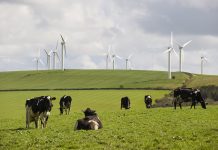Distributor and transmission operator SSEN today pledged £4.8 Billion of grid improvements by 2028, to prep its networks for bi-directionality, flex and Net Zero.
Connecting 3.8 million power users in Scotland and central southern England, the DNO will hike by 35% its previous network investment during the five-year RIIO-ED2 regulatory period starting in 2023.
It claims today’s draft business plan, submitted to Ofgem, balances the need for smart networks against keeping bills down.
Prompted by customer feedback the firm, one of only two DNOs vertically integrated across transmission and distribution, sets as targets:
- cutting by 20% the frequency and length of power cuts
- bedding in Net Zero with a £1bn outlay on ‘strategic resilience’
- achieving a customer satisfaction score of at least 9.2 in every area of customer contact
- support 200,000 customers in fuel poverty, with resilience or energy efficiency measures
- providing capacity to connect an extra 1.3 million EVs and 800,000 heat pumps
- cut carbon from operations by at least 35%, aligned to a science-based target of 1.5 C warming
Lead the outlay will be £2.2bn invested in asset reliability and resilience. More than £1bn will deliver an additional 2GW of new capacity, aiming to accelerate Net Zero for communities. All expenditure, including general running costs of £500m, will be subject to year-on-year efficiency savings of 0.5%.
If approved by the regulator, the value of SSEN Distribution’s asset portfolio will rise by over £6.0bn by 2028.
The DNO also proposes over £900m of regulatory ‘wriggle room’, aimed at providing the flexibility needed to meet customer and network needs driven by changes in technology and policy.
The budget’s impact on customers’ bills won’t be known before Ofgem adjudicates provisionally on the plan next spring. A final decision is due in December 2022.
SSEN said baseline investment is consistent with no planned increase in network charges. It highlighted its changing financial disciplines, including extending asset write-downs from 20 to 45 years, a continuing efficiency drive, and lower finance costs.
SSEN Distribution managing director Chris Burchell enthused, “The need to transform our energy system to address the climate emergency has never been clearer.
“It is critical that local electricity networks are an enabler rather than a constraint, as we work toward a shared Net Zero goal.
More on SSEN’s desired grid investments here.



